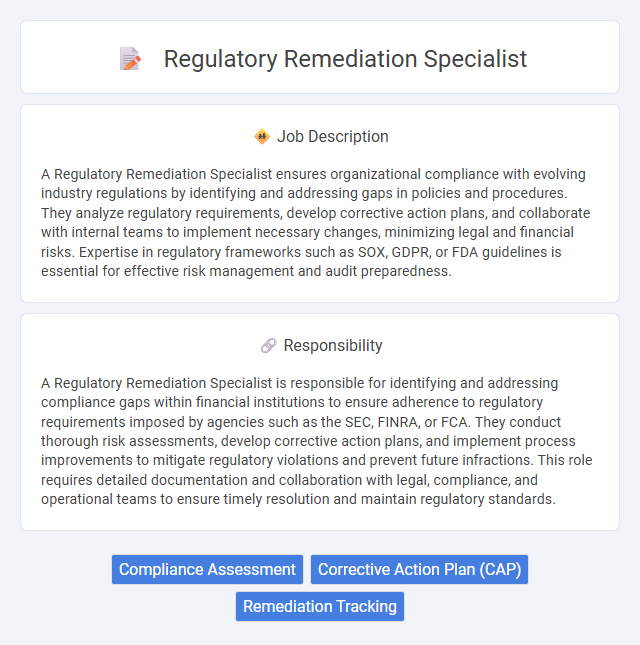
A Regulatory Remediation Specialist ensures organizational compliance with evolving industry regulations by identifying and addressing gaps in policies and procedures. They analyze regulatory requirements, develop corrective action plans, and collaborate with internal teams to implement necessary changes, minimizing legal and financial risks. Expertise in regulatory frameworks such as SOX, GDPR, or FDA guidelines is essential for effective risk management and audit preparedness.
Individuals who are detail-oriented and possess strong analytical skills will likely be suitable for a regulatory remediation specialist role, as the job involves ensuring compliance with complex regulations. People who handle pressure well and can navigate evolving legal frameworks may find this position fitting. Candidates lacking patience or a solid understanding of regulatory environments might struggle to meet the demands effectively.
Qualification
A Regulatory Remediation Specialist requires a strong foundation in compliance frameworks such as FDA, EMA, or HIPAA, alongside expertise in risk assessment and audit methodologies. Proficiency in regulatory requirements, policy development, and corrective action planning is essential to ensure organizational adherence to industry standards. Advanced qualifications often include certifications like Certified Regulatory Compliance Manager (CRCM) or relevant advanced degrees in regulatory affairs or law.
Responsibility
A Regulatory Remediation Specialist is responsible for identifying and addressing compliance gaps within financial institutions to ensure adherence to regulatory requirements imposed by agencies such as the SEC, FINRA, or FCA. They conduct thorough risk assessments, develop corrective action plans, and implement process improvements to mitigate regulatory violations and prevent future infractions. This role requires detailed documentation and collaboration with legal, compliance, and operational teams to ensure timely resolution and maintain regulatory standards.
Benefit
Regulatory remediation specialists likely provide significant benefits by ensuring organizations comply with evolving legal and regulatory requirements, reducing the risk of costly penalties and reputational damage. Their expertise probably improves operational efficiency by identifying and addressing compliance gaps swiftly, which may enhance stakeholder confidence and business stability. Engaging a regulatory remediation specialist often leads to more effective risk management and streamlined corrective actions, potentially saving companies time and resources in the long term.
Challenge
Regulatory remediation specialists often face the challenge of navigating complex and evolving compliance landscapes that require meticulous attention to detail and proactive problem-solving skills. They may likely encounter pressure to identify and rectify compliance gaps swiftly to avoid penalties, increasing the demand for thorough documentation and effective communication with regulatory bodies. Managing stakeholder expectations while ensuring timely remediation efforts could also pose significant difficulties in this role.
Career Advancement
Regulatory remediation specialists play a critical role in identifying and resolving compliance gaps within financial institutions, ensuring adherence to evolving regulatory standards such as GDPR, SOX, and Dodd-Frank. Expertise in regulatory frameworks enhances career advancement opportunities, enabling progression into senior compliance roles, risk management leadership, or consultancy positions within highly regulated industries. Continuous professional development and certifications like Certified Regulatory Compliance Manager (CRCM) significantly boost prospects for career growth and higher remuneration.
Key Terms
Compliance Assessment
Regulatory remediation specialists conduct comprehensive compliance assessments to identify gaps between current practices and regulatory requirements. They analyze internal controls, policies, and procedures to ensure adherence to evolving laws and industry standards. Their expertise supports organizations in mitigating risks and preparing effective action plans for regulatory compliance.
Corrective Action Plan (CAP)
A Regulatory Remediation Specialist expertly develops and implements Corrective Action Plans (CAP) to address compliance gaps and regulatory deficiencies in financial institutions. This role involves thorough root cause analysis, documentation of issues, and collaboration with internal teams to design corrective measures that ensure adherence to industry standards and legal requirements. Timely execution and monitoring of CAP effectiveness are critical to prevent regulatory penalties and promote sustainable compliance.
Remediation Tracking
A Regulatory Remediation Specialist expertly manages remediation tracking to ensure compliance with evolving regulatory requirements and internal policies. This role involves maintaining detailed records, monitoring progress of remediation efforts, and identifying gaps to mitigate potential compliance risks efficiently. Proficiency in regulatory frameworks such as AML, GDPR, and SOX enhances effectiveness in remediation tracking and reporting.
 kuljobs.com
kuljobs.com